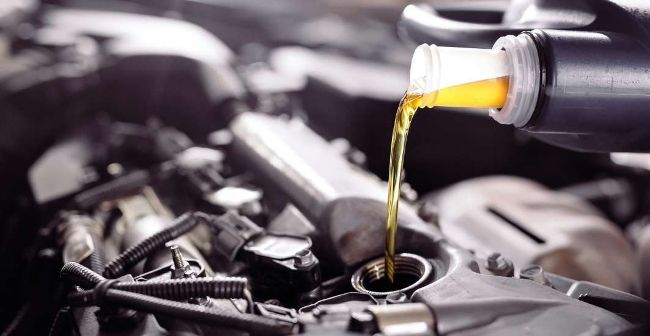Motor Oils viscosity grades

SOURCE | SHUTTERSTOCK/DAVID TADEVOSIAN
IS IT OK TO SWITCH MOTOR OIL WEIGHTS, FOR EXAMPLE, FROM A 5W-20 TO A 10W-30?
It depends. Some vehicle manufacturers provide a range of recommended motor oil viscosity grades based on the outside temperature in which the car is driven. Other manufacturers recommend the use of only one motor oil viscosity grade. For best engine performance, always follow the manufacturer’s recommendations found in your vehicle’s owner’s manual.
IS IT OK TO USE 5W-30 IN A CAR IF THE OWNER’S MANUAL CALLS FOR 5W-20?
Valvoline does not recommend doing this. Using a heavier grade than recommended may cause decrease in fuel economy, higher engine loads and eventually shortened engine life. Using a lighter grade than recommended may result in excessive mechanical wear and reduced engine life. For maximum engine performance, follow the recommended motor oil viscosity and maintenance schedule provided in your vehicle’s owner’s manual.
WHAT DOES THE “W” IN A GRADE OF MOTOR OIL STAND FOR?
The “W” in motor oil stands for winter. The first number in the oil classification refers to a cold weather viscosity. The lower this number is, the less viscous your oil will be at low temperatures. For example, a 5Wmotor oil will flow better at lower temperatures than a 15Wmotor oil. The higher number, following the “W” refers to hot weather viscosity, or how fluid your oil is at hot temperatures. The higher the number, the thicker the oil at a specified temperature.
IS THICKER OIL BETTER?
In some circumstances, thicker oil can be used to compensate for increased bearing clearances (gaps between bearing and rotating shaft) that have developed over the years. A large change in bearing clearances can result in poorer lubrication. For best performance, always follow the recommendations for motor oil viscosity in your vehicle’s owner’s manual.
WHEN DOES IT MAKE SENSE TO USE STRAIGHT WEIGHT OIL (SAE30) VERSUS A MULTIGRADE OIL (5W-30)?
Straight weight oil is never recommended for use in a system that requires a multi-viscosity oil. Straight weight oils are generally recommended for smaller engines or older vehicles that were made before multi-viscosity oils were produced.
IS SWITCHING TYPES OF MOTOR OIL (CONVEN-TIONAL, SYNTHETIC, ETC) HARMFUL TO MY VEHICLE’S ENGINE?
Conventional, synthetic blend, synthetic and high mileage motor oils are compatible and will not harm your vehicle’s engine. For maximum engine performance, follow the motor oil type recommendation provided in your vehicle’s owner’s manual. .
This article is courtesy of Valvoline Global. To find out more about their product range, visit https://www.valvoline.com/